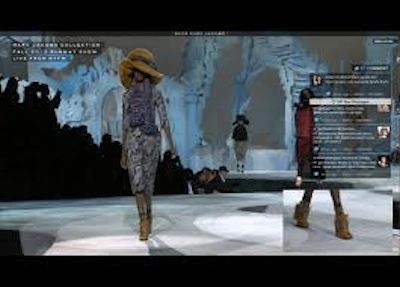If ever there were an industry ripe for disruption, it would be the fashion industry. Long ruled by a clique of insiders, who presumed they knew best what new styles you would buy; it’s been, in the words serial entrepreneur Jon Fahrner, a “historically closed industry.”
Central to how that industry functions is Fashion Week, which happens twice a year in the major fashion capitals of the world – New York, Paris, London and Milan.
These, of course, have been exclusive events attended by industry insiders, with little access for the public – until recently.
A scrappy Palo Alto startup you’ve probably never heard of called BumeBox has a lot to do with why Fashion Week is changing.
At last spring’s Fashion Week in New York, BumeBox partnered with Marc Jacobs to produce a real-time, 20-minute, streaming runway event narrated over Twitter by the iconic designer that produced higher levels of engagement with users (including 18,000 Tweets) than anything had previously.
At the time, BumeBox the company was less than a year old, and among those blown away by its success at the Jacobs event was B Productions, the long-time leading production company specializing in videotaping of runway shows since the New York event launched back in 1993.
Last week, accordingly, BumeBox and B Productions announced a new partnership to open up next month’s Fashion Week to allow other top brands to do what Jacobs did last spring. Jacobs has once again signed on, as has Tory Burch, with others expected soon.
BumeBox CEO Fahrner says his company has developed proprietary technology that embeds a high quality video experience on the designers’ branded sites rather than building any kind of consumer interface of its own.
“The brand and the social media experience come together on their website,” he says. “It all happens there, not on Facebook or Twitter.
“It's not one size fits all, however,” he continues. "Our same base technology is highly customizable for each brand. Meantime, we are invisible. No one knows about us.”
BumeBox works with Fortune 1000 brands outside of the fashion industry as well, like eBay, which sponsors Nascar events, and Universal Sports, as during the recent Olympics, or the trailer hyping Ridley Scott’s Prometheus.
The startup also delivers rich new sets of metrics to its clients that measure the levels of engagement achieved with their audiences at real-time social media events.
“We look at likes, mentions, and all of the much more compelling data, including the numbers of people who are they, how long they stay there watching a conversation, or a video.
“This is very helpful data for brands, as well as being compelling immersive experience for consumers. As far as the data is concerned, the brands can see X number people in Japan vs. Y number in UK like a particular fashion. So we're helping people actually get what they want!”
The company is small, having just hired its seventh employee. It’s “cash flow positive,” according to Fahrner, and has been funded to date by friends & family, and angels.
Fahrner says being in the Bay Area has been critical in his little company’s early success in “cracking the code” of marrying big brands with social media streaming.
“Being here has a huge effect on us in terms of our credibility overseas and even on the east coast,” he explains. “The fact that we are a few steps from Stanford campus right now is a clear advantage for us.”
Related Articles
